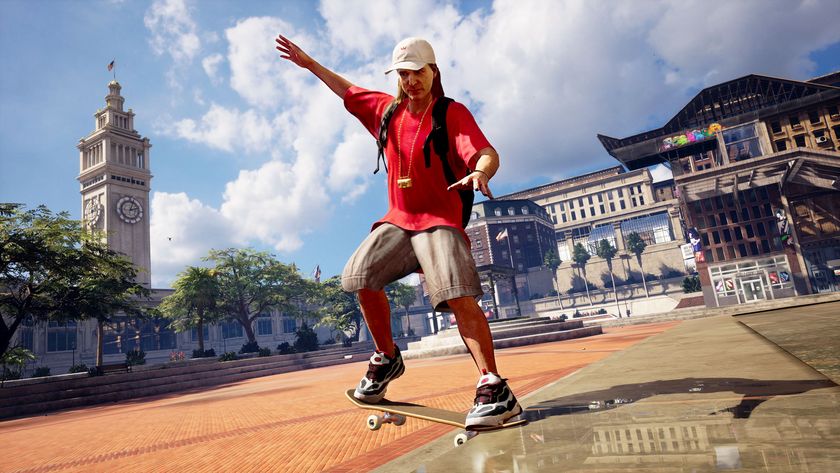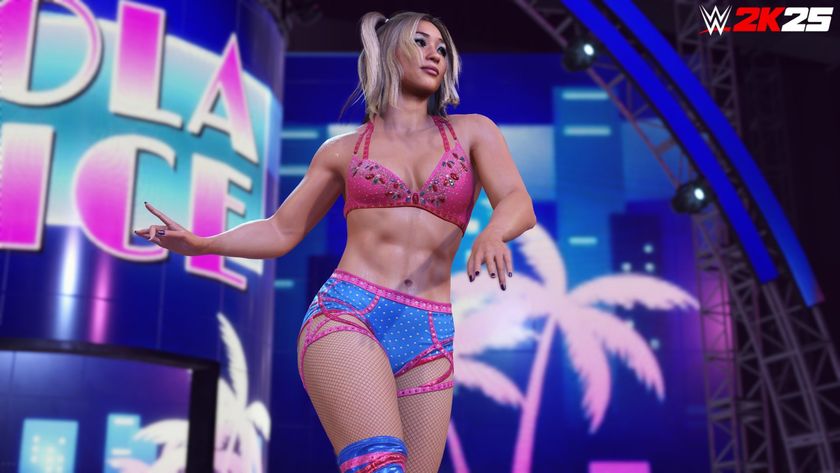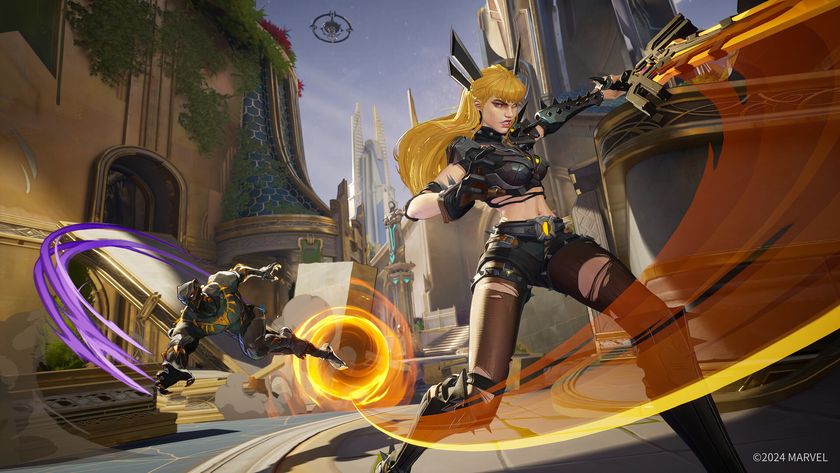Why it's time for you to start caring about eSports
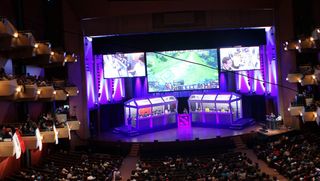
Get in the game
By now, we've all heard the endless recitation of numbers: the hundreds of thousands of viewers, the gigantic prize pools, and the billions of man-hours churned in game servers owned by Blizzard, Valve, and Riot Games. eSports has quickly grown to be a major landmark in gaming culture, and as witnessed by the rampant outgrowth of Multiplayer Online Battle Arena games trying to catch a ride on League of Legends' shockingly successful coattails, it's throwing around a ton of weight.
Though Reddit's front page is regularly invaded by eSports-related threads, as r/leagueoflegends' 300,000-strong subscribers rocket a particularly noteworthy topic to the top, sheer presence isn't a reason to care about it. The jargon-laden eSports culture can be intimidating to a newcomer, and it's hard for the casual observer to understand why so many people are getting hyped up about watching somebody else play a video game. There are other, better reasons you should start getting into eSports, and we're here to let you know why now is the time.
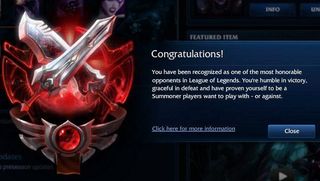
It's helping build better gaming communities
The competitive gaming community gets saddled with a bad rap for toxic behavior and antagonistic player interactions. This is especially true for MOBAs like League of Legends, where the game is balanced as such that a bad player can be the direct cause for his or her team's defeat. Frustration make tempers run high, and words get exchanged that a player would normally not use on even his or her worst enemies.
Cue cognitive neuroscientist Jeffrey Lyte Lin, entering stage left. With a test population of over 32 million players at last count, Lin's experiments in player behavior modification are fed by one of the field's largest data firehoses, and the results often surprise. According to his Game Developers Conference presentation, just making cross-team chat optional alone dropped negative player comments by about 33%, with a corresponding and equivalent or better rise in positive behavior, despite no drop in overall banter. The priming experiments, factored in for a wide demographic spread of age, culture and gender, are especially of interest to human behavior research in general.

It requires as much teamwork as other sports
The common public perspective of a professional gamer is that of a kid in his parent's basement, bedecked in a gigantic headset as he stares at a monitor for hours, clicking and typing away like a jackhammer during an earthquake. Nothing about that image elicits professional athleticism, and the US government's recent decision to streamline the acquisition process of an athletic visa for competitors in the Riot League Championship Series program garnered an unsurprising amount of skepticism. It's not as if they were real athletes, right?
Author, musician and Oakland Raiders punter Chris Kluwe disagrees. "I challenge you to watch a top ranked livestream of League and tell me there isn't just as much teamwork required as a successful TD pass," said Kluwe over Twitter. "As an actual real life athlete, I would like to point out that e-Sports takes just as much dedication and practice." The Starcraft 2 scene, with its major corporate sponsors, heavily regimented training and famously developed infrastructure of coaches and analysts, has long since made professionalism the expected thing from its players.
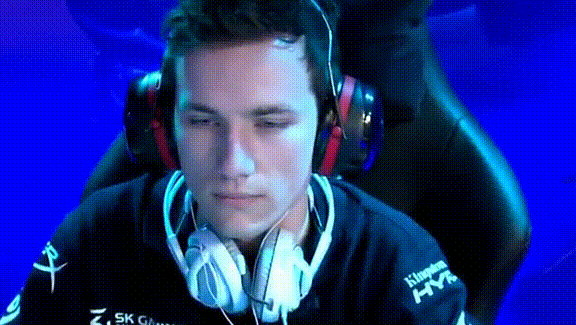
The cyberathletes bust gamer stereotypes
While ease on the spectators' eyes isn't the most important factor when judging eSports, it certainly helps its cause that a good number of its players are, to put it simply, highly attractive specimens of the species. League of Legends players John "Hyrqbot" Velly and Stephen "Snoopeh" Ellis topped Reddit's Ladyboners section (yes, that's a real subreddit), to the delight and appreciation of its salacious ladies and gentlemen.
Sure, that might sound superficial, but there's a practical side to all this leering. Korean Starcraft 2 team Prime keeps itself afloat via sales of team apparel modeled by its players, and their well-groomed appearance is reflective of the scene's media savviness in general. Riot Games is also attentive to how their professional gamers sell the scene, and regularly conduct media training with LCS participants. While good looks and fashionability isn't necessary to succeed in the eSports world, it's a quality that sponsors appreciate, and help pay the team house bills.
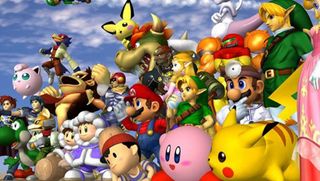
There are big prizes and fueled by passion
Thus far, we've avoided citing the more commonly expressed numbers, like stream viewership or prize pools. But the fighting game community has at least one worth mentioning: approximately 130,000 viewers for the Super Smash Bros tournament at the 2013 EVO Championship Series. While not the most jaw-dropping viewership number in eSports history, it is noteworthy for the totally community-driven nature of the event. The twelve-year-old game was included in this year's EVO by weight of its fans' donations to the Breast Cancer Research Foundation, winning with a total contribution of over $93,000, yet was nearly canceled at the last second by Nintendo's legal department. With the legal hurdle successfully passed, Melee's EVO 2013 presence became its most popular in its entire history.
Though DOTA 2's International 3 is directly organized and sponsored by Valve, its community's anything but lethargic. The prize pool for TI3 was funded in part by sales of the Interactive Compendium, adding over $940k to a total of $2.6m--the largest pool for any single tournament in eSports history.
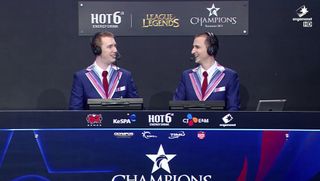
The casting and announcing is spectacular
Even in Starcraft 2, where the oozing green and gory glory of a beautifully executed Baneling bust is exciting for players of all skill levels to see, a total newcomer to tournament streams will have almost no idea what's going on, and absolutely none as to why.
No surprise, then, that so much focus has been put on eSports' casting aspect. Nick "Tasteless" Plott and Dan "Artosis" Stemkoski have made a career out of untangling the dense knots of high-level Korean strategy to GOMTV's audience of millions, and the Tastosis combo has been one of the most celebrated in the scene's history. Rival studio OnGameNet's duo of Christopher "MonteCristo" Mykles and Erik "DoA" Lonnquist are possibly the first to be dedicated cross-disciplinary casters covering both the League of Legends Champions tournament and the Starcraft 2 World Championship Series. Meanwhile, Riot's hired Leigh "Deman" Smith, veteran of the competitive Battlefield 1942 and Supreme Commander scenes, along with a host of others to provide novice-friendly and high-energy coverage of LCS games.

It has more heart than you'd expect
"Out of the four of you, you're my best friend," said Marcus "Dyrus" Hill, choked up and tearful, as he and former Team Solomid player Shan "Chaox" Huang shared a last heartfelt embrace before the latter's forced departure from the team. And everywhere, viewers of Gamespot's GameCrib series echoed Redditor brbwinning's exclamation: "I can't believe I cried to a League of Legends reality show!"
The story of eSports isn't about the increasingly massive corporate backing, the advertising revenue pumping to and from Twitch.tv, or the dizzying and opaque array of kill-death ratios, actions-per-minute averages or other statistics. The human element is at the crux of it all, from the sad yet predictable estrangement among families as a player's ambition clashes against their parent's lack of comprehension, to heartwarming moments of camaraderie and fellowship. When an explanation is needed for why eSports fans are so dedicated to the scene, Sean "Day[9]" Plott's Daily #100 vlog is often pulled out as a trump card: his story of friendship, family, and eSports the first and final argument of the scene's worthiness.
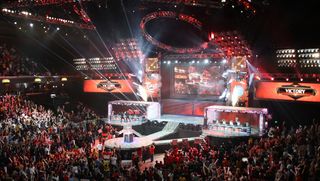
It's only going to get bigger
eSports' history is laden with a plethora of hurdles. The sudden collapse of the Championship Gaming Series by DirecTV, as well as the Cyberathlete Professional League's twisted and murky legal history and status, had stalled out the western scene's growth, while the combination of a gambling scandal among Starcraft: Brood War players and the rough transition into Starcraft 2 chilled the once-white-hot Korean scene.
All that is swiftly changing. The direct involvement and invested effort by a game's publisher is unprecedented in eSports history, channeling both millions of dollars and concerted human resources towards establishing a permanent and international league. But a league can't survive if its players can't dedicated their time towards competition, and that's where Twitch.tv's online media approach steps in, creating an advertiser-driven ecosystem rewarding and paying streamers for the entertainment they provide and audience they cultivate. eSports is on the cusp of achieving what nuclear physicists are still wracking their brains trying to bring to fruition: profitable, self-sustaining criticality. This, right now, is the perfect time to catch a ride on its blast wave.

Game on
The future of competitive gaming is getting brighter. Big games are including eSports-ready features, next-gen consoles are coming streaming-ready, and everyone is prepared for video games to be the next big competitive thing. Are you ready?
And if you're looking for more, check out how eSports is shaping the future of gaming and how League of Legends is evolving its eSports.
Most Popular







